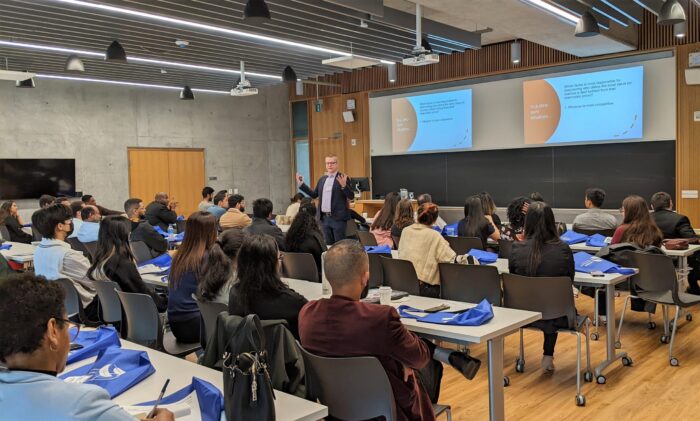-
Advance Your Career with Schulich’s Certificate in Digital Transformation
Schulich’s Certificate in Digital Transformation program is supported by RBC Foundation and is a flagship initiative designed to educate and upskill the next generation of digital leaders.
Designed for mid-career professionals, corporate intrapreneurs and leaders of small and medium enterprises, this 12-week in-person program equips participants with the knowledge, tools, and real-world experience needed to lead transformation in an AI-powered world.
The certificate explores emerging technologies and their role in innovation, analytics, marketing, and risk management.
With expert faculty, immersive case studies, and peer collaboration, participants will gain the strategic vision and practical insights to drive AI adoption and organizational change.
Launching in October 2025, this program will empower leaders to shape the future of Canada’s digital economy.
-
Learn More About Schulich’s Certificate in Digital Transformation
Apply Now >
-
Program Format & Delivery
The Certificate in Digital Transformation is delivered in person on an annual basis, beginning October 2025, to a select cohort of 15 participants.
The program features six hours of weekly instruction over 12 weeks covering a broad range of topics including digital strategy, operations, AI adoption, cybersecurity, and change management.
Each cohort will engage in interactive sessions, expert-led discussions, and case-based learning to build the skills needed to lead successful digital transformation initiatives in today’s evolving business landscape.
The program cost is $3,000 and a limited amount of scholarship is available.
-

Who Should Take this Certificate Program?
Whether you’re driving your organization’s digital roadmap or launching the next big innovation, the Certificate in Digital Transformation is designed for you – the professional who is shaping the future through technology. This program is ideally suited for:
Mid-Career Professionals
If you’re integrating digital tools to streamline operations, elevate team performance, or lead transformation initiatives, this program will give you the frameworks and strategies you need to succeed. Ideal participants include:
- IT & Digital Strategy Managers guiding adoption and implementation of transformative tech.
- Product Managers developing market-responsive digital products and services.
- HR & Organizational Development Professionals using digital solutions to enhance workplace engagement and productivity.
- Marketing Managers leveraging data and digital platforms to deepen customer connections and drive business growth.
SME Leaders & Corporate Intrapreneurs
Corporate intrapreneurs and leaders of small and medium enterprises looking to scale their ventures using digital innovation will find powerful, practical insights in this program. Learn to harness emerging technologies to grow smarter and faster.
-
Powered by the Generous Support of RBC Foundation
RBC Foundation’s investment with Schulich in the development of the Certificate in Digital Transformation reflects a shared commitment to preparing Canada’s workforce for the future. With one billion jobs worldwide expected to be transformed by technology in the next decade (OECD), and 15% of Canada’s workforce projected to be disrupted during the shift to a high-tech, net-zero economy (RBC Economics), the need for upskilling has never been more urgent.
As the founding partner, RBC Foundation will also play an active role in enriching the program experience through thought leadership, guest speakers, and mentorship opportunities. From speaking at Schulich’s annual Digital Business Conference to supporting capstone project development, RBC experts will provide real-world insights that bridge learning and practice.
Thanks to the generous support and forward-looking vision of RBC Foundation, program fees have been kept accessible — ensuring more Canadians will have the opportunity to lead digital change.
-

Information
Curriculum Overview: Program Modules
View details Hide detailsProgram Modules:
Learning Objectives
- Understand the key drivers and components of digital transformation
- Recognize the impact of digital transformation across various industries
- Identify future trends and technological advancements in digital transformation
Module Description
This module provides a structured introduction to digital transformation, examining its core components and the key drivers that are reshaping organizations. It explores how shifts in customer expectations, regulatory pressures, competitive dynamics, and technological advancements are influencing business models and operating practices. The session highlights the role of emerging technologies such as artificial intelligence, cloud computing, and advanced analytics in enabling transformation, while also addressing the organizational challenges that accompany these changes. It concludes with a forward-looking assessment of future trends and the implications they hold for strategy, investment, and workforce capabilities.
 Dr. Murat Kristal
Dr. Murat Kristal
Bio: Professor of Operations Management, Schulich School of Business. PhD, University of North Carolina. Founding director of Schulich’s MBAN and MMAI programs; current director of the MBA in Technology Leadership. Published in leading operations journals. Advisor on analytics, AI, and digital transformation. Recognized Top 40 Professors under 40 (2016) and Ontario Award of Excellence (2020).
Learning Objectives
- Develop a comprehensive digital strategy aligned with business objectives
- Analyze various digital business models and their applications
- Evaluate metrics for measuring digital transformation success
Module Description
The Digital Strategy and Business Models module equips participants with the tools to design and implement digital strategies that drive organizational growth and resilience. Participants will explore digital strategy frameworks, review components of digital business models, examine case studies of digital transformations, and learn how to align digital initiatives with overarching business objectives. The module emphasizes practical application, enabling participants to assess opportunities, mitigate risks, and establish metrics to evaluate the impact of digital strategies.
 Dr. Zdenek Necas
Dr. Zdenek Necas
Bio: Adjunct Professor, Schulich School of Business. Holds advanced degrees from HEC Paris, IESE, INSEAD, and a PhD from Ivey, with research at Rotman and Wharton. Teaches Strategic Management; research on innovation in complex organizations. Former investment banker and strategy consultant advising multinational leaders on finance and strategy.
Learning Objectives
- Develop a comprehensive digital strategy aligned with business objectives
- Analyze various digital business models and their applications
- Evaluate metrics for measuring digital transformation success
Module Description
This course explores how digital and physical technologies enhance efficiency, effectiveness, and integration in operations and supply chains. Covering process analysis, Lean Six Sigma, TQM and the use of new technologies (e.g., Internet of Things, Machine Learning, AI) in enterprise-level information systems, this course aims to develop a fundamental understanding of choices made by operations and supply chain managers.
 Dr. Markus Biehl
Dr. Markus Biehl
Bio: Professor, Schulich School of Business. Teaches Operations, Supply Chain, Analytics, and Sustainable Management. Research on responsible business and operations–IT interface; recipient of multiple research grants and awards. Consultant on sustainable global operations. Former Associate Dean, Senator, and IMBA Director; currently Academic Director for Accreditations & Rankings.
Learning Objectives
- Understand key technologies driving digital transformation
- Foster a culture of innovation within an organization
- Apply digital transformation frameworks effectively
Module Description
This module gives business leaders a practical playbook to move technology transformation from promising ideas to real, sustainable business value. Using Benefits Realization Management (BRM) as our lens, we will take a closer look at how transformation manifests across four key stages:
Design – In the design phase, we focus on ensuring that our key decisions – such as procurement, resourcing, and risk management – are aligned to our technology transformation goals. We do this by framing benefits, beneficiaries, measures, and enabling changes required up-front. We will use Wardley Maps at a plain-English level to decide build/buy/reuse, avoid commodity traps, and procure solutions and supports that are appropriately mapped to our needs and resources.
Build – In the build phase, we make sure that we can successfully develop the solutions and supports needed to drive change through thoughtful planning, execution, and risk management. We explore ways to balance agility and innovation with oversight in a highly regulated business environment.
Implement – In the implement phase, we focus on making sure that the “change will take”, by treating adoption as the mechanism that realizes business benefits. We identify the business and behavioural changes needed to support successful benefits realization, and explore the various ways we can address these needs through combinations of different supports.
Sustain/Expand – In the sustain/expand phase, we set our sights on making sure that benefits continue to be realized through our transformation work while also exploring how we can leverage success to impact a wider scope of business activities. We will discuss how to transition from pilot to program through coordinated handoffs and lightweight governance, capture lessons learned, and find new ways to leverage new people, process and technology capabilities in other areas of the organization that can benefit.
During the evening sessions, we will focus on exploring and discussing each of these phases. Saturday will be a hands-on studio where teams will run a realistic, RBC-focused case end-to-end using the techniques and approaches we’ve learned, producing simple, executive-ready outputs.

Tarun Rihal, MBA, MSc, SSBB
Bio: Ontario Public Service executive with 15+ years leading technology-driven change in regulated environments. Specializes in turning data, analytics, and AI strategies into results by bridging strategy to execution. Supports Ontario’s 30 ministries in embedding data management and AI to enhance service quality, accountability, and ROI.
Learning Objectives
- Enhance customer experience through digital
- Implement data-driven marketing
- Develop personalized and engaging customer
Module Description
This module examines cutting-edge research and technological innovations that are reshaping customer experience, digital marketing, and the broader path of digital transformation. Students explore how advancements in artificial intelligence, including generative AI, are being used to understand consumers, predict behavior, and improve decision-making. The module highlights applications such as emotion detection, neuromarketing, biometrics, AI companions, and the wider data ecosystem. Privacy and ethical concerns are discussed and considered in light of these new advancements in consumer data.
The module also develops a strong builder mindset. Students learn that leadership in digital transformation requires both understanding digital tools and co-creating with them. Through hands-on exercises, students will work with emerging technologies and build their own marketing chatbot.

Dr. David Rice
Bio: Associate Professor of Marketing, Schulich School of Business, and Executive Director of the Future of Marketing Institute. Published over 60 scholarly papers and presented research in 20+ countries. Provides market research and strategic consulting to Fortune 100 and 500 companies, including Microsoft, Intel, Dell, Procter & Gamble, Ford, and Pfizer.
Learning Objectives
- Develop leadership skills suited for digital transformation
- Manage and lead digital teams effectively
- Navigate change management in digital transformation
Module Description
This module examines how to establish knowledgeable, flexible, and resilient work units that can effectively respond to strategic-level changes within organizations. It will complement the technical and diagnostic skills learned in other modules. While a manager needs strong analytical skills to develop optimal solutions to problems, good leadership and communication skills are needed for these solutions to be accepted and implemented.
We will focus on effective leadership and managerial behaviors. Given that the study of leadership in organizations has steadily shifted away from the notion of leaders as omnipotent heroes and toward the concept of leaders as facilitators and influencers, we will focus our attention on these skills. Specifically, we will focus on the topics of team dynamics, decision-making, and charismatic leadership.
 Dr. Kevin Tasa
Dr. Kevin Tasa
Bio: Associate Dean, Academic, Schulich School of Business. Holds an MSc in Health Administration and a PhD from Rotman. Research on group decision-making, negotiation, and team dynamics; published in top-tier journals. Co-author of widely used Canadian textbooks and recipient of MBA Teaching Excellence Awards at McMaster and Schulich.
Learning Objectives
- Understand cybersecurity challenges in digital transformation
- Implement robust cybersecurity measures
- Ensure data privacy and compliance
Module Description
This module explores the critical intersection between digital transformation and cybersecurity. As organizations embrace digital technologies, data-driven strategies and AI-powered solutions, safeguarding systems, data, and trust becomes a cornerstone of sustainable transformation. Participants will gain a solid foundation in cybersecurity principles while understanding how emerging technologies, such as artificial intelligence, both amplify cyber threats and create new defense mechanisms.
 Adjunct Professor Victor J. Garcia, MBA
Adjunct Professor Victor J. Garcia, MBA
Bio: Faculty at Schulich since 2013, teaching Tech MBA, MBAN, MMAI, and SEEC. President & CEO of ABC Live Corporation; former CTO, Hewlett-Packard Canada. Advisor to governments and boards, co-founder of Ryerson Hispanic Student Awards. MBA with Distinction, Aston University; executive education, Columbia Business School; expert in digital transformation, AI, and cybersecurity.
Learning Objectives
- Develop KPIs and metrics for digital transformation
- Implement continuous improvement strategies
- Evaluate and sustain the ROI of digital initiatives
Module Description
This module equips participants with the tools and frameworks to define, measure, and sustain the success of digital transformation initiatives. Through real-world case studies, expert insights, and interactive group work, participants will learn how to develop effective KPIs, implement continuous improvement strategies, evaluate ROI, and apply future-proofing principles such as modularity, AI-readiness, and composable architecture. The session culminates in a collaborative capstone where teams design and present a digital strategy using the tools and concepts covered throughout the week.
 Gale Geddes
Gale Geddes
Bio: Global Head of Digital Transformation, Manulife. Digital pioneer with 30 years’ experience across Financial Services, Government, Telecom, and Retail. Expert in defining and delivering large-scale transformation programs, leveraging deep digital knowledge, a passion for exceptional customer experiences, and a commitment to aligning organizations for meaningful, results-driven transformational outcomes.
Additional Program Features Overview
View details Hide details-
- The program will feature a capstone project in which students will develop a comprehensive digital transformation strategy for a client organization and present their innovative ideas to an expert panel of Schulich faculty members, industry experts and RBC employees for evaluation and feedback
- Among many key deliverables, the capstone project strategy will include recommendations on how the client might adopt and scale AI technologies to improve operations, enhance customer experience and foster innovation within their organization
- Participants who complete all modules and the capstone project receive a certificate of completion
- The Certificate in Digital Transformation will include an in-person networking session where participants connect with peers, faculty, Schulich alumni and industry leaders, fostering collaboration and professional relationships
- Participants will have the unique opportunity to attend the annual Digital Business Conference organized by the Institute of Digital Business (IDB), alongside representatives from RBC. This conference will offer an invaluable platform to explore the latest advancements in digital transformation, engage with thought leaders and network with industry pioneers shaping the future of this dynamic field
Contact Us – Have Questions
To learn more or get in touch with our team, please email us at:
digitalcertificate@schulich.yorku.ca